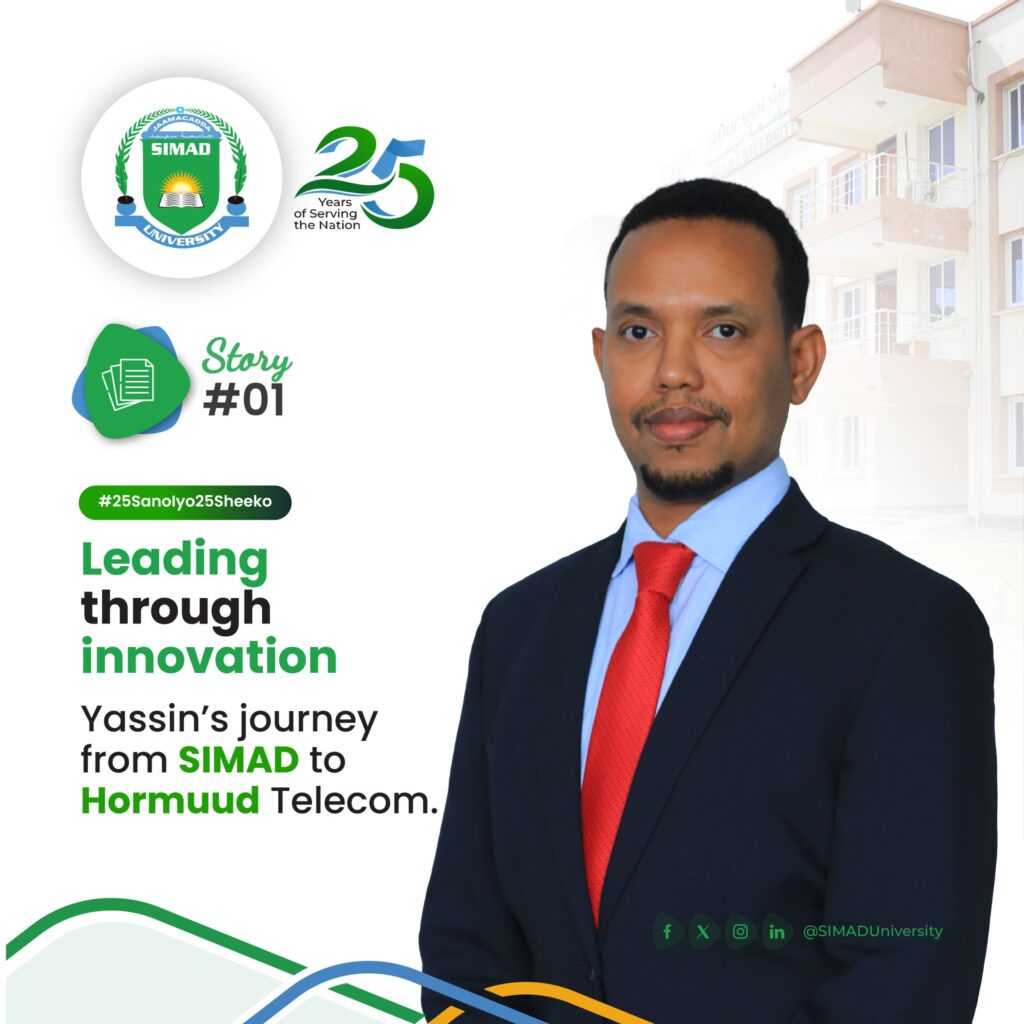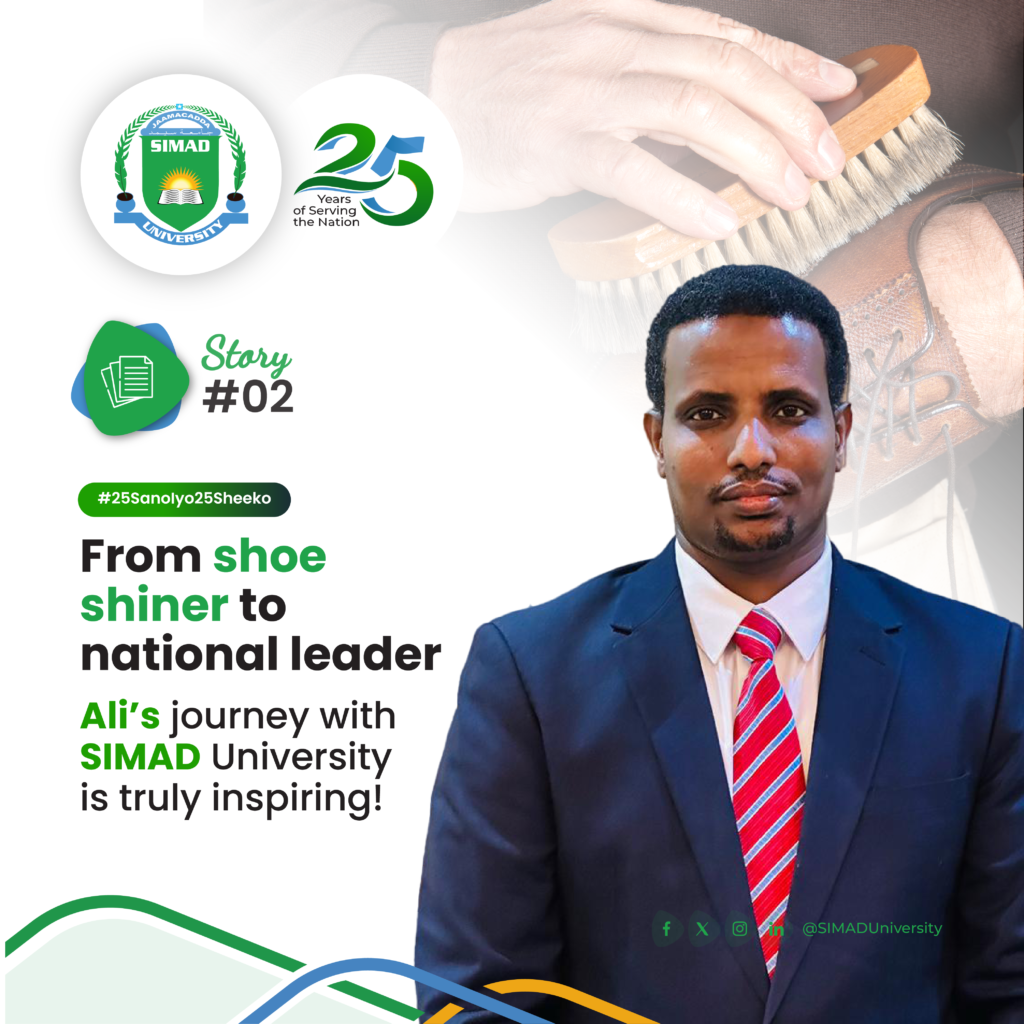Abdikadir Mohiadin Ahmed, affectionately known as “Dalha” within the SIMAD University community, graduated in 2014 with a degree in Public Administration. He reflects on his journey with deep gratitude for the university that laid the foundation for his successful career in Somalia’s public sector. Today, Dalha serves as the Director General of Planning, Investment, and Economic Development for the Banadir Region, a role in which he oversees key initiatives to drive economic growth and development in Mogadishu and beyond.
After graduating from SIMAD, Dalha began his career as the Chief of Staff for the Governor of Banadir, a member of the Federal Republic of Somalia administration. His rise through the ranks has been swift, holding various leadership roles in humanitarian efforts and departmental units within the government. Over the years, he has furthered his education, earning a Master’s degree in Development Studies from Jomo Kenyatta University of Agriculture and Technology, as well as a postgraduate degree in Political Science from Somali National University.
Dalha credits SIMAD University with shaping both his career and character. The education he received in public administration was not only relevant but also integral to his aspirations of joining the public sector and contributing to Somalia’s state-building process.
According to Dalha, SIMAD University has been a critical player in developing Somalia’s human capital. Over the last decade, the university has earned a strong reputation for producing graduates who are highly capable and well-prepared for both public and private sector roles. Dalha has seen this firsthand, noting that many SIMAD graduates hold key positions in government, ranging from ministerial roles to civil service jobs. His own experience in public service confirms the university’s impact. He often acknowledges, along with his colleagues, that SIMAD graduates bring credibility and quality to the workforce. This is especially true in the public sector, where SIMAD alumni are making significant contributions to governance and policy development.
As Somalia rebuilds after years of conflict and instability, Dalha is optimistic about the country’s future. He believes that Somalia is experiencing progress in both security and economic development, and SIMAD University has an important role to play in this resurgence. By equipping its students with the skills needed for leadership, governance, and public administration, SIMAD is contributing to Somalia’s state-building efforts.
Dalha has also witnessed the growth of SIMAD University over the years. From the opening of new campuses to the introduction of cutting-edge initiatives like the SIMAD iLab, the university has made impressive strides in providing top-tier education to its students. He is confident that SIMAD will continue to lead the way in higher education, shaping the future leaders of Somalia.
Despite his busy schedule, Dalha remains deeply connected to SIMAD University. He frequently returns to deliver guest lectures in his fields of expertise—public administration and political science—and actively contributes to the university’s development plans. He also maintains personal relationships with his former lecturers and colleagues, ensuring that his connection to the university remains strong.
In his professional role, Dalha has collaborated with SIMAD University on various initiatives, including consultancy services for the Banadir administration. He works closely with SIMAD graduates who are part of his directorate, contributing to the planning and development of Mogadishu. To him, SIMAD is not just an institution—it is a partner in the development of the country.
One of Dalha’s most memorable experiences at SIMAD University occurred during his second semester. He had the opportunity to attend an international NGO workshop in Nairobi but missed two critical exams—CAT 1 and CAT 2—while attending the event. Upon his return, he requested the exam office to allow him to retake the missed exams. However, he was directed to read the university’s policies, which clearly stated that missed exams could not be retaken.
Though it was a challenging moment, Dalha learned a valuable lesson in discipline, resilience, and the importance of adhering to regulations. He worked hard to compensate for the lost marks and successfully passed the semester. This experience instilled in him a deep respect for policies and fairness, values that he continues to uphold in his role as a public servant.
Dalha’s story is a testament to the enduring impact of SIMAD University on its graduates and the country. The education, experiences, and values he gained at SIMAD have shaped his career and contributed to the progress of Somalia’s public sector. He believes that the university will continue to play a crucial role in developing the human capital necessary to build a stronger, more resilient Somalia.
As Dalha reflects on his journey, he expresses his gratitude to SIMAD University for giving him the foundation to pursue his dreams. His connection to the university remains unwavering, and he is committed to supporting its continued growth and success. Through his story, Dalha celebrates the role SIMAD University has played in shaping the future of Somalia—one graduate at a time.


